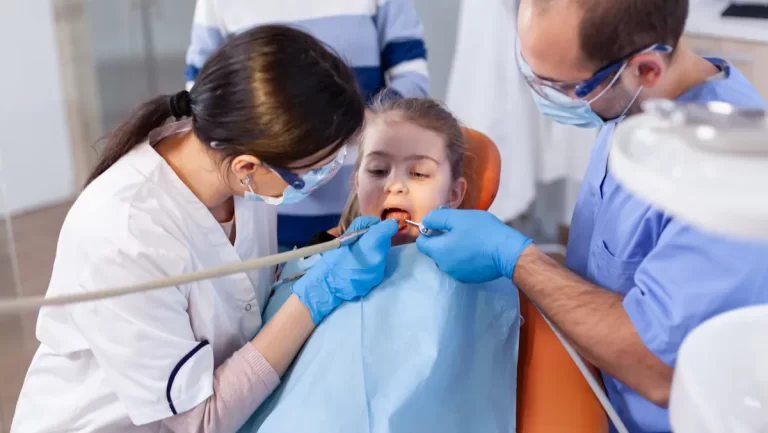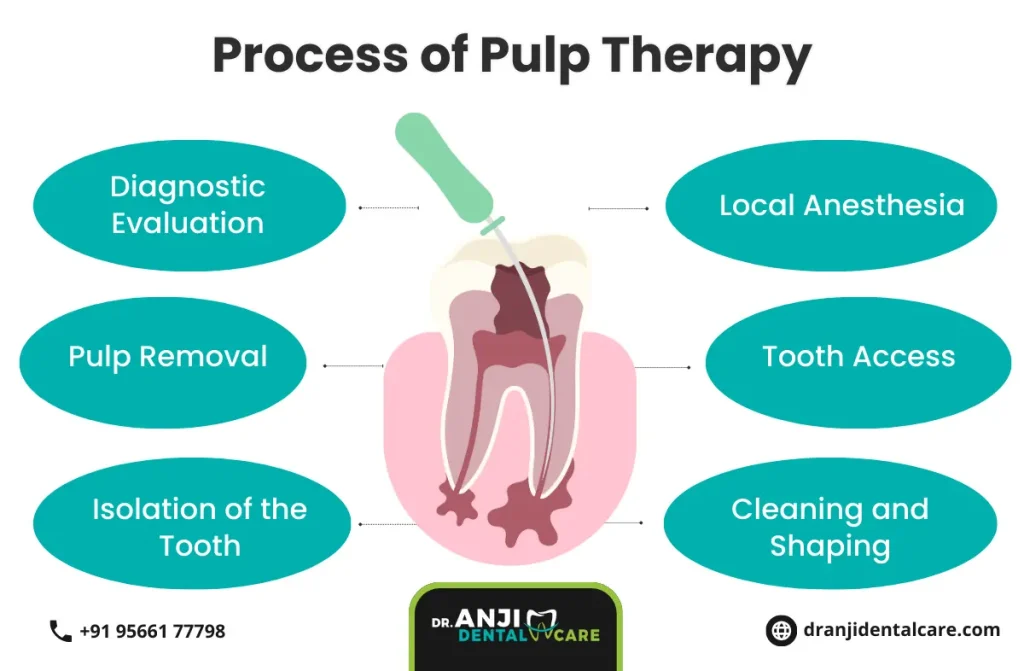Pulp Therapy

Pulp Therapy: Preserving and Treating the Dental Pulp in Children
Pulp therapy is a vital component of pediatric dentistry that focuses on preserving and treating the dental pulp in children. The dental pulp, located deep within the tooth, consists of blood vessels, nerves, and connective tissue. When the pulp becomes infected or damaged due to dental decay or trauma, pulp therapy treatment in Chennai becomes necessary to save the tooth and promote oral health. Here at Dr. Anji Dental Care, we will explore the various aspects of pulp therapy, including its purpose, common procedures, benefits, and what parents can expect during their child’s pulp therapy treatment.
Process and Purpose of Pulp Therapy

The primary purpose of root canal treatment is to save the affected tooth by treating and preserving the dental pulp. In children, dental decay or trauma can lead to pulp exposure or infection. Without timely intervention, the infection can spread and potentially affect the developing permanent teeth. Pulp therapy aims to eliminate infection, alleviate pain, and maintain the integrity and function of the affected tooth. By preserving the dental pulp, the natural tooth structure is retained, avoiding the need for premature tooth extraction and potential orthodontic complications.
Common Pulp Therapy Procedures
Pulpotomy
A pulpotomy is the partial removal of the infected or inflamed pulp from the crown portion of the tooth. The dentist will carefully remove the affected tissue and place a medicated material to soothe the remaining healthy pulp during the pulp therapy treatment in Chennai. A dental restoration, such as a stainless-steel crown, is often placed to protect the remaining tooth structure.
Pulpectomy
In cases where the infection extends into the root canals, a pulpectomy is performed. This procedure involves the complete removal of the diseased pulp from both the crown and root canals. The canals are then disinfected, cleaned thoroughly and filled with a biocompatible material. A dental crown is typically placed during the pulp therapy treatment in Chennai to restore the tooth's structure and function.
Apexogenesis
Apexogenesis is performed when the dental pulp is injured but still has the potential to continue root development. The affected portion of the pulp is removed, and a medicated material is placed to encourage the pulp to continue growing. Regular monitoring and follow-up appointments with the dentist to get the root canal treatment in Chennai are necessary to assess root development and determine if further treatment is needed.
Apexification
Apexification is performed when the dental pulp is necrotic or unable to continue root development. The procedure involves removing the diseased pulp and filling the root canal with an inert material. This pulp therapy treatment in Chennai promotes the formation of a hard barrier at the root tip, allowing for the placement of a dental crown to restore the tooth's structure.
Benefits of Pulp Therapy Treatment in Chennai
Preservation of Natural Teeth
Pulp therapy aims to save the affected tooth, preserving the natural tooth structure and avoiding the need for premature extraction. This helps maintain proper dental arch development and prevents potential orthodontic issues.
Alleviation of Pain and Discomfort
Root canal treatment in Anna Nagar effectively eliminates infection and reduces pain and discomfort associated with infected dental pulp. Restoring oral health and function improves the child's overall well-being.
Promotion of Oral Health
By treating the infected or damaged dental pulp, pulp therapy prevents the spread of infection to neighboring teeth and the development of more severe oral health problems.
Maintaining Space for Permanent Teeth
Preserving primary teeth through pulp therapy treatment in Chennai helps maintain proper spacing for permanent teeth. Premature loss of primary teeth can lead to crowding and alignment issues in the permanent dentition.
Psychological Benefits
Preserving natural teeth through pulp therapy while considering the root canal treatment in Chennai can positively impact a child's self-esteem.
Conclusion
In conclusion, at Dr. Anji Dental Care, pulp therapy is a vital dental treatment that aims to preserve the health of the dental pulp and maintain the integrity of the affected tooth. By addressing pulp-related issues promptly, it allows for the restoration of function and alleviation of pain, ultimately contributing to the overall oral health and well-being of the patient.
Frequently Asked Questions
Pulp therapy, also known as root canal treatment for baby teeth, is a dental procedure designed to treat and save a child's primary (baby) tooth when the pulp (the innermost part of the tooth containing nerves and blood vessels) becomes infected or damaged. The procedure involves removing the affected pulp, cleaning and disinfecting the space, and then filling and sealing it to prevent further infection.
Pulp therapy becomes necessary when the pulp of a baby tooth is compromised due to extensive decay, trauma, or infection. If left untreated, these conditions can lead to severe pain, abscess formation, and the premature loss of the primary tooth. Preserving baby teeth is crucial for maintaining proper spacing and alignment, as they serve as placeholders for permanent teeth.
Signs that your child may need pulp therapy include persistent toothache, sensitivity to hot or cold, swelling or tenderness around the gums, and discoloration of the tooth. If you notice any of these symptoms, it's important to consult with a pediatric dentist in Chennai. They will conduct a thorough examination, possibly including X-rays, to assess the condition of the tooth and determine if pulp therapy is necessary.






























